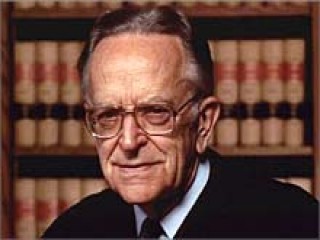
Harry Blackmun biography
Date of birth : 1908-11-12
Date of death : 1999-03-04
Birthplace : Nashville, Illinois
Nationality : American
Category : Politics
Last modified : 2011-06-02
Credited as : Judge, Supreme Court, Roe v. Wade
Harry Blackmun, appointed to the U.S. Supreme Court by President Nixon, became a highly regarded justice usually taking a middle-of-the-road position.
Harry A. Blackmun was born November 12, 1908, in Nashville, Illinois, but spent his youth in the Minneapolis-St. Paul area of Minnesota where his father, Corwin Manning Blackmun, was a businessman. There he developed a lifelong friendship with Warren Burger, a school classmate. Attending Harvard as a mathematics major, he thought of becoming a physician, but instead chose law, graduating in 1932 from the Harvard Law School, where he had studied under Felix Frankfurter. Returning to St. Paul, he served as law clerk to a U.S. circuit court judge, John B. Sanborn, whom he later succeeded on that court. In 1933 he took a teaching position at the St. Paul College of Law, and in 1945 he began teaching at the University of Minnesota Law School. He then had a private practice in Minneapolis until he became resident counsel for the famous Mayo Clinic in Rochester, Minnesota. Appointed by Eisenhower to the eighth circuit, he developed a reputation as a conservative, relatively progressive in civil rights matters and moderate in civil liberties cases.
Appointed to the Supreme Court by Richard Nixon, Blackmun was confirmed without opposition. In his first years Blackmun was frequently described as one of the "Minnesota Twins," given the frequency of his agreement with Chief Justice Burger. This pattern changed in time, with Blackmun moving to a more liberal posture.
Blackmun's lower court career presaged his later judicial behavior. A believer in judicial restraint and limitation of the court's broad policy-making prerogatives, his decisions reflected his desire to keep issues narrow and avoid setting forth broad and bold principles.
Blackmun's Supreme Court opinions ranged widely. Generally devoid of any overarching ideology or philosophy, they reflected his own personal views and at times seemed somewhat contradictory. Very much a case by case justice, his absence of dogmatism contrasted with his more conservative colleagues such as William Rehnquist and Sandra Day O'Connor.
Blackmun wrote opinions of significance in four areas. In First Amendment cases, although he dissented from the Court's ruling that stopped the government from repressing The Pentagon Papers, he overturned a "gag order" imposed by a Nebraska court prohibiting commentary or reporting on a murder trial (Nebraska Press Association v. Stuart, 1975). Here he attempted to balance First Amendment rights of free press with Sixth Amendment rights of fair trial. He was conservative on obscenity cases, upholding a federal conviction which prohibited the mailing of obscene material even though the books involved were not obscene under applicable state law (Smith v. California, 1977). His landmark free speech cases were those overruling the commercial speech doctrine, extending speech protection to commercial advertising (Virginia State Board of Pharmacy v. Virginia Citizens Consumer Council, 1976) and to attorneys to advertise their professional services (Bates v. State Bar of Arizona, 1977). The press, consumers, and the general public all benefitted from these rulings.
Blackmun's most famous and controversial ruling was his opinion in Roe v. Wade (1973), declaring that the right of privacy included a woman's right to terminate her pregnancy by means of an abortion. This effectively invalidated the varying abortion statutes in 46 of the 50 states and provoked a moral, philosophical, and theological controversy that has seldom abated since that time. Blackmun found women's fundamental right to personal privacy in the Fourteenth Amendment's concept of personal liberty affording a woman protection in determining whether or not to terminate her pregnancy. The right, however, was not absolute, and he made clear that it could be regulated when the state's interest was "compelling." Subsequently, he set aside state laws requiring women to get the consent of a spouse or a parent before having an abortion (Planned Parenthood of Central Missouri v. Danforth, 1976).
In the area of criminal law, Blackmun generally voted to curb the expansion of defendant's rights. He took a restrictive view of the "exclusionary" rule and modified the guarantees of the Fourth Amendment permitting routine police inventory searches of cars without warrants (South Dakota v. Opperman, 1976). He sustained the right of states to use six-member juries (Ballew v. Georgia, 1978), but held that due process does not require jury trials in state juvenile delinquency proceedings (McKeiver v. Pennsylvania, 1971). On the other hand, he did not always vote for the government. He sustained the Miranda warnings given after an arrest and found police misconduct indefensible in a number of instances. His own personal distaste and abhorrence for the death penalty was reflected in opinions in that area which put him at odds with the Court's majority.
On environmental issues he called for an imaginative expansion of traditional standing concepts that would allow public interest groups to enter environmental cases. His rulings regarding legal problems of the poor, on the other hand, proved unsympathetic.
















